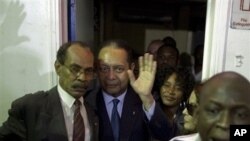In a move that surprised many, former Haitian dictator Jean Claude Duvalier, 59, returned to Port-au-Prince, Sunday. It's been 25 years since "Baby Doc" fled the country, to live in exile in France. Hundreds of people were gathered at the international airport when he returned -- among them, VOA stringer, Clarens Renois, who talked to the Creole Service's Lyonel Desmarattes about what the former leader said and did when he first arrived.
LYONEL: Clarens Renois, you were at the Toussaint Louverture international airport when Jean Claude Duvalier was arriving, can you tell us what it was like?
CLARENS: Everything went well Lyonel. I can tell you that people were quite curious when they found out that he was coming back, they didn't believe it was true that Jean Claude Duvalier had returned 25 years after he left the country. There was some confusion too because Immigrations [Customs] was overflowing with their own employees, in addition to Duvalier supporters who came to see the former president and then people who simply came out of curiosity. It was a huge surprise even for Jean Claude Duvalier, himself. By the look on his face, it seemed as though he couldn't believe he was really back in Haiti. There was a lot of pushing and shoving too before Duvalier could finally get to the Immigrations counter and then make his way inside the airport. It actually took about two hours for him to get off the bus that had brought him to the Immigrations counter.
So there was a lot of confusion even though people were obviously thrilled to see him -- his supporters, some young people and there were also people who were protesting his return to Haiti because they feel he should be judged for his crimes. Those protesters say Aristide should also be allowed back, if Duvalier got permission to return to the country.
LYONEL: Some people are saying the first thing Duvalier did when he arrived was kiss the ground. Can you confirm that? Did he make any initial statements? Did he talk to anyone at the airport?
CLARENS: Well, he didn't make any statements when he arrived. He said he wasn't going to say anything for now, except that he had returned to Haiti to "help". That was the only thing he said. He seemed very happy. But according to his wife, Veronique Roy, who accompanied him, Duvalier said "this is Dessaline's country, my country" when his feet touched the ground -- so those were his first words. Then Duvalier walked inside the airport and waiting for him there, were his former foreign minister, Adrien Raymond, the former director of the presidential guard, some other close friends, and former members of his protocol were was also there. His wife said she was surprised to see all those people because she didn't tell anyone he was coming back.
LYONEL: The US press says Duvalier is returning during a very difficult time for Haiti, historically. There was an earthquake, a cholera epidemic -- over a million people are living in tents. The press wonders whether Duvalier has any plans to participate in Haiti's reconstruction. What has the Haitian press and politicians said in that regard?
CLARENS: Duvalier, himself, responded to that question. His wife told us that was his main reason for returning to Haiti. He was really troubled by what he saw after the earthquake. He came back with a diplomatic passport that had been issued to him under the provisional government, a few years ago. Duvalier decided after the earthquake, that he must return to Haiti. The more serious issue he is returning is the political crisis - specifically the electoral crisis. Duvalier certainly could participate -- maybe not directly -- but his presence in Haiti at this juncture is going to represent a "new element" in the political climate, and in the electoral situation.
LYONEL: Is there any possibility - even on technical grounds that he'll be able to participate in the electoral process?
CLARENS: No, of course not. But the fact that Duvalier has returned to Haiti is important. It means something. Is Duvalier's presence going to influence the political game? Is he going to support a particular candidate? Is he going to participate in the process? It is obvious that his presence is going to have some impact on the electoral situation.
LYONEL: The US press account I read said Duvalier looks like he's aged. You were at the airport how did he look to you?
CLARENS: Yes, he does look older. He's probably 59 or 60 now and he looked weak, as though he's been ill. He didn't seem to be in the best health. People remember Duvalier as strong and vibrant, but that wasn't the Duvalier we saw at the airport on January 16.




